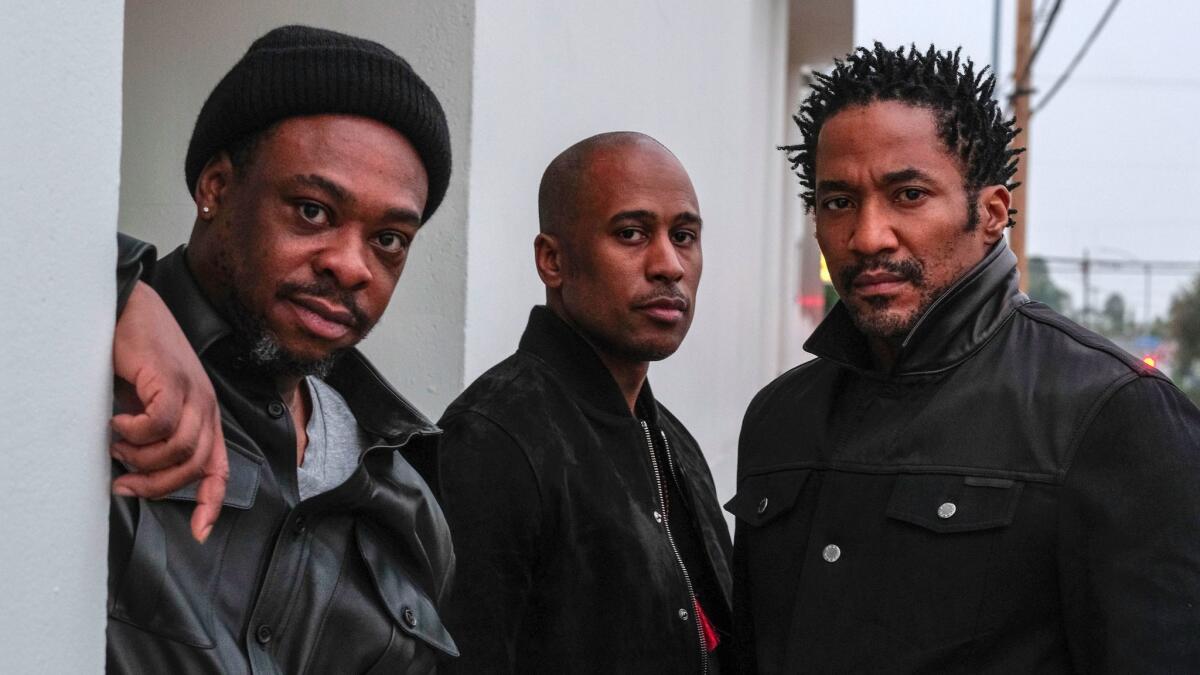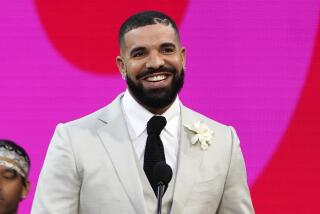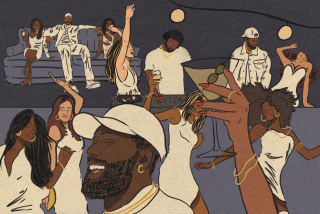At FYF Fest and elsewhere, hip-hop embraces middle age

At last month’s BET Awards, rapper and Internet talk-show host Joe Budden got into a highly publicized tiff with the members of Migos after he walked out of his own red-carpet interview with that Atlanta hip-hop trio.
What exactly had so irritated Budden, a blustering East Coast traditionalist best known for his 2003 hit “Pump It Up,” isn’t clear; he later said the Migos MCs are poor interviewees, though he also seems to dislike their music.
Whatever the case, the incident was the 36-year-old Budden’s second scrape in recent months with a much younger hip-hop act, following a combative interview with Lil Yachty on Budden’s popular Web series, “Everyday Struggle.” In both cases, Budden was widely mocked online as a kind of crotchety rap grandpa — a reminder, as if one were needed, that hip-hop has only accelerated in the digital age.
Yet not every older rapper is being viewed as a laughingstock. For all its fixation on what’s new and what’s next, the genre is increasingly making room for a growing class of hip-hop elders. Most visibly, Jay-Z just topped the Billboard 200 at age 47 with his highly acclaimed new album, “4:44.”
There are splashy new documentaries about the long and winding careers of Puff Daddy and Dr. Dre. And amid the up-and-comers booked for this weekend’s FYF Fest you’ll find A Tribe Called Quest, the veteran New York outfit whose 2016 album grapples with the death of one of its members, and Missy Elliott, the trailblazing singer and rapper who’s preparing to release her first album in over a decade.
Taken together, this work — and the warmth with which it’s been received — suggests that hip-hop has become a viable platform for middle-aged concerns.
That’s a development rock fans witnessed decades ago, as that genre’s pioneers reached their 40s and began writing about family, politics and the environment.
But hip-hop is a younger style, of course, dating back only to the late 1970s (by which time Bob Dylan had already been around long enough to be born again). It’s also a more competitive form, with less of a natural inclination toward showing the vulnerabilities of age.
That’s part of what makes “4:44” so stunning: Here’s Jay-Z, who for years presented himself as coolly untouchable, taking down his defenses in a way we’ve never heard.
You could argue he had no choice, given that the album was destined to be seen as his response to “Lemonade,” the 2016 blockbuster on which his wife, Beyoncé, appeared to be accusing him of cheating on her.
But the detail and feeling with which he owns up to his mistakes — the mistakes of a family man with something to lose — mark “4:44” as something far beyond an exercise in brand maintenance.
Not that he doesn’t have business on his mind. Here again, though, Jay-Z is talking about money and power in a different way than he did as a brash twentysomething.
“Generational wealth” is the term he uses at one point in a song about setting up his children for success; he also emphasizes the importance of black entrepreneurship, a long-running theme in Jay-Z’s career but one he’s never discussed as precisely — and with as much authority — as he does here.
Those ideas figure prominently in the documentaries as well: “The Defiant Ones,” a four-part HBO series about Dr. Dre’s enduring partnership with producer and record executive Jimmy Iovine, and “Can’t Stop Won’t Stop: A Bad Boy Story,” which recounts the history of Puff Daddy’s record label against the backdrop of a 2016 reunion of its biggest stars, including Mase and Lil’ Kim.
Both films show how these former hustlers established a foothold in the mainstream music industry — and how they later adapted, or didn’t, to the strictures of corporate America. In each case, you’re watching a rapper confront decisions that rappers simply haven’t confronted before. And you’re watching both do so eagerly (especially the decisions involving billions of dollars).
In December the surviving members of A Tribe Called Quest — Q-Tip, Ali Shaheed Muhammad and Jarobi White — spoke to The Times about their album “We Got It From Here … Thank You 4 Your Service,” which serves in part as a farewell to their former bandmate Phife Dawg, who died last year from complications of diabetes.
Needless to say, their mood regarding Phife was melancholy. But what struck me in our talk was how gratified they were to have made an album that took up adult ideas about mortality and immigration and misogyny.
Maturity, Q-Tip said, “is a gift. You’re more interesting at 38 than you were at 28.” He went on to praise “Blue & Lonesome,” the happily ravaged blues album the Rolling Stones had just released.
“You know it wouldn’t be as good if they were younger,” the rapper insisted.
And yet there’s more than one way to grow up in hip-hop. In January, Elliott, who recently turned 46, put out a spacey comeback single, “I’m Better,” that suggested she’s no less interested in sonic discovery than she was in the late ’90s and early ’00s, when she broke out with boldly futuristic hits such as “The Rain (Supa Dupa Fly)” and “Get Ur Freak On.”
It’s not that you can’t hear her age on the record, or that she sounds like she’s running from it. But there’s no trace in “I’m Better” of the classicist approach Jay-Z takes on “4:44.”
For Elliott, perhaps, the gift of maturity is simply having more time to find what’s next.
Twitter: @mikaelwood
ALSO
Why Niia took a slow route to soul-music success
‘This was divinely inspired’: A Tribe Called Quest on the year’s most surprising comeback
More to Read
The biggest entertainment stories
Get our big stories about Hollywood, film, television, music, arts, culture and more right in your inbox as soon as they publish.
You may occasionally receive promotional content from the Los Angeles Times.







